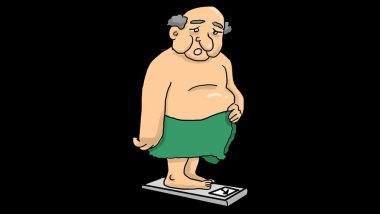World Obesity Day is celebrated on the 11th of October every year to generated awareness regarding the disease. The day is observed all across the globe with the aim of promoting practical solutions to end the global obesity crisis that is only increasing every day. Organised by the World Obesity Federation which is a non-profit body and has officially collaborated with the World Health Organisation. This day aims to bring attention to obesity and to "lead and drive global efforts to reduce, prevent and treat obesity."
What is Obesity?
It is a condition when your body stores excess fat, so much so that it begins to affect other body parts as well. Usually, when a person gains weight and takes no steps to burn it, the fat ends up getting collected around the various essential body parts like the liver causing fatty liver disease or filling in the arteries around the heart that may even cause heart attacks. Obesity is one of the most prominent non-communicable diseases that is killing people. Do you about this year's World Obesity Day theme? World Obesity Day 2018 Theme is to ‘End Weight Stigma’ that Targets Stereotyping of Obesity in the Media.

The solution to obesity is hidden in one's lifestyle. A non-sedentary lifestyle that includes a healthy diet, yoga and physical fitness can help a person combat obesity that isn't otherwise because of some underlying condition. However, it isn't as easy as it seems to be. It is in fact way more difficult, and because of that, some people have to undergo surgeries like liposuction etc. People having arteries filled with fat have to an angioplasty done. However, there is a lot of stigmas attached to obesity in our society that don't tend to leave. These myths and misconceptions are only making it difficult for people struggling with obesity to get rid of it. World Obesity Day 2018: 8 Scientific Tips To Beat Weight Gain Naturally.
Here are a Few Myths about Obesity
Lack of physical activity or unhealthy dietary habits is the primary cause of obesity. Whenever we see a person struggling with obesity, we tend to believe that the person is lazy and loves fast food, which is actually not the case. There are a lot of health conditions that may make you obese. Some of the medications may also have similar effects. The causes could range anywhere from insufficient sleep, psychological stress, endocrine disruptors, medications, intrauterine and intergenerational effects. Most physicians tend only to advise the patient to eat less junk food and exercise which may narrow down the treatment for them. A study rightly recommends, 'Physicians must move beyond the simplistic and generally ineffective recommendation to “eat less and move more” by investigating and addressing the determinants of increased energy intake, decreased metabolic rate, and reduced activity.'
Obese people are inactive- There is a notion that is widespread that obese people are usually excessively sluggish, lazy and should get off the couch. Unfortunately, the discriminating behaviour isn't just restricted to the general public but within the health professionals as well. Some obese people have a meagre metabolic rate and also may have difficulty in exercising. Studies suggest that, 'Rather than focusing on burning calories, interventions should aim at reducing sedentary activities and increasing physical activities to improve overall health and general well-being.'
A weight loss program that cuts down the fats may not always be a successful program. Instead of focusing on the numbers and the weight loss scale, one must concentrate on healthier holistic behaviour. Merely reducing numbers on the scale doesn't prove that you're healthily losing weight.
Diets work in the long-term- If you think that by dieting for a short period of time you are going to reap its benefits long-term, you couldn't be more wrong. There is a notion prevalent among people that simple 'getting on a diet' will provide them with a long-term weight loss. However, the truth is that about two-thirds of people who lose weight will regain it within one year, and almost all of them will regain it within five years, if not maintained. More important than the diet change is a lifestyle change.
Anyone with willpower can lose weight- While willpower really helps in sticking to a particular form of weight loss regimen but that is not always the case. But just one size doesn't fit all; you must understand that the magnitude of weight loss is very different among individuals. The people may have similar weight but very different metabolic rate. Therefore a person with a slow weight loss process may have a decreased willpower within weeks of getting on a diet.
Weight loss is always healthy- It is not always healthy to lose weight, and some weight loss does have significant adverse effects. Sudden an inappropriate body fat loss increases the drive to eat, reduces energy expenditure immensely and raises the chances of hypoglycemia. Weight loss has also been linked to psychological stress, depressive symptoms, etc. and studies also claim that weight loss also increases levels of persistent organic pollutants that promote hormone disruption and metabolic complications.
Exercising helps to lose weight better than dieting- Many people believe that exercise alone results in weight loss. Despite being associated with a range of health benefits, there is only so much exercise can do. Exercise is known to increase appetite, and if you suppress it or don't feed yourself with something healthy, the effects of exercise won't show. Increased exercise has been shown to reduce visceral adiposity (even with minimal changes in body weight).
Obesity has become a serious health threat because we lack effective strategies to address this condition and the myths are making the condition only worsened. We need to work on it on an individual and a societal level.
(The above story first appeared on LatestLY on Oct 11, 2018 12:20 PM IST. For more news and updates on politics, world, sports, entertainment and lifestyle, log on to our website latestly.com).













 Quickly
Quickly





















